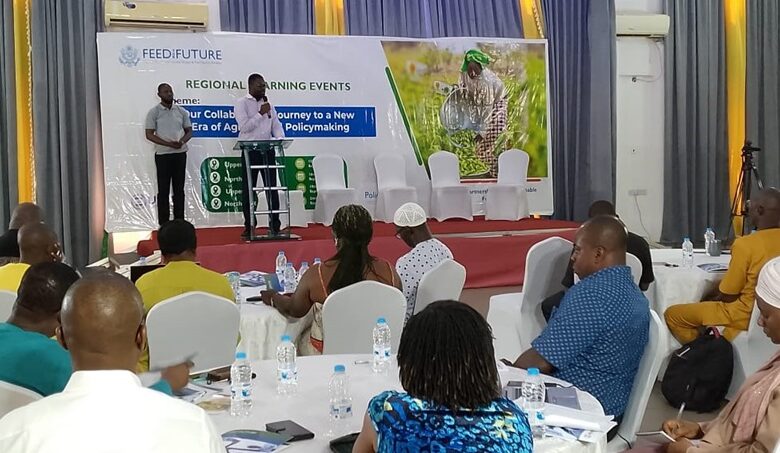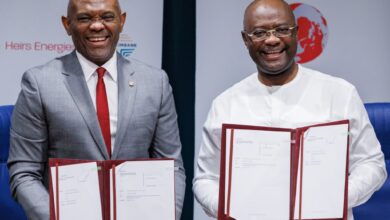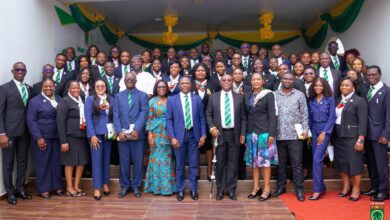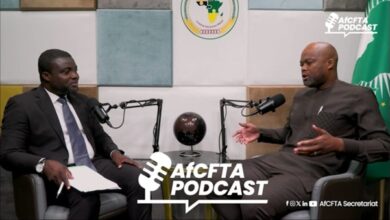US govt-funded activity supports farmers with climate information services

A total of 3,000 farmers under the United States Government-funded Activity; Feed the Future Ghana Policy LINK, have been provided climate information services to enhance their resilience in the agriculture sector.
The Feed the Future Ghana Policy LINK Activity, since 2021 through its various initiatives including Leading for Change (L4C), Women Awardees Training, Climate Finance Capacity Building Training, among others, also engaged over 4,000 individuals in food security programmes thus expanding the Activity’s outreach and impact.
The initiative, which is being carried out in the Northern, North East, Upper East, Upper West and Savannah Regions, has also fostered collaboration among over 200 key organisations in a multi-stakeholder platform thereby enhancing cooperation in food security endeavours.
These were made known at a two-day consultative Regional Learning Event, held in Tamale, to review the interventions, evaluate their successes, challenges and to solicit stakeholders’ input towards maximising their impact in the country.
The event was organised under the theme: “Our Collaborative Journey to a New Era of Agricultural Policymaking”.
It attracted cross section of relevant stakeholders in the agriculture and climate change space, youth groups, women-led organisations and civil society organisations.
The Feed the Future Ghana Policy LINK Activity has also developed over 12 policy briefs outlining impact, constraints, and interventions produced from climate, landscape, and agriculture lending assessments.
Similarly, about 49 female farmers were also empowered to champion gender equality and female empowerment in both public and private sectors.
Mr Yunus Abdulai, Country Lead, Feed the Future Ghana Policy LINK Activity, speaking during the event, said the regional series of the learning events was part of efforts to share the results of the implementation of the Feed the Future Ghana Policy LINK Activity over the past three years and to strategise on areas that required improvement.
He said the Activity had been working in the country towards ensuring that policy formulation and implementation processes were inclusive using evidence-based approaches to design and execute policies.
He said, “We have been able to support a number of initiatives around reviving key policies and regulations in the agricultural sector such as the climate-smart agriculture and inclusivity action plan that got outdated in 2020 and was updated through effective collaboration with the Ministry of Food and Agriculture.”
He called for more investment and support in the agricultural sector to enhance food production and security.
Hajia Hawa Musah, Northern Regional Director of Agriculture, who was represented at the event, commended the Feed the Future Ghana Policy LINK Activity for supporting the Regional Department of Agriculture to establish the Regional Agriculture Investment Coordination Unit, which played a critical role in revamping agricultural sector in the region.
She mentioned that through the support of the Feed the Future Ghana Policy LINK Activity, the Research and Extension Coordination Linkage had also been instrumental in the country’s drive for sustainable food security.
Miss Fathiaya Zakari, Advocacy and Engagement Officer at YEFL-Ghana, an NGO, and Alumnus of the first cohort of the L4C Programme, commended Feed the Future Ghana Policy LINK Activity for engaging young people on issues of agriculture and climate change.
She appealed to youth groups in the country to demonstrate more interest in agriculture through advocacy for policies and programmes that ensured inclusivity and transparency.
Participants, during group discussions, called on the Feed the Future Ghana Policy LINK Activity, to invest through partnership with the necessary agencies, on long-term agricultural policies and programmes that guaranteed sustainable food security systems.
They also called for effective media engagement and involvement in their activities to help raise more awareness on issues of climate change, food security and sustainable measures to enhance food production.




